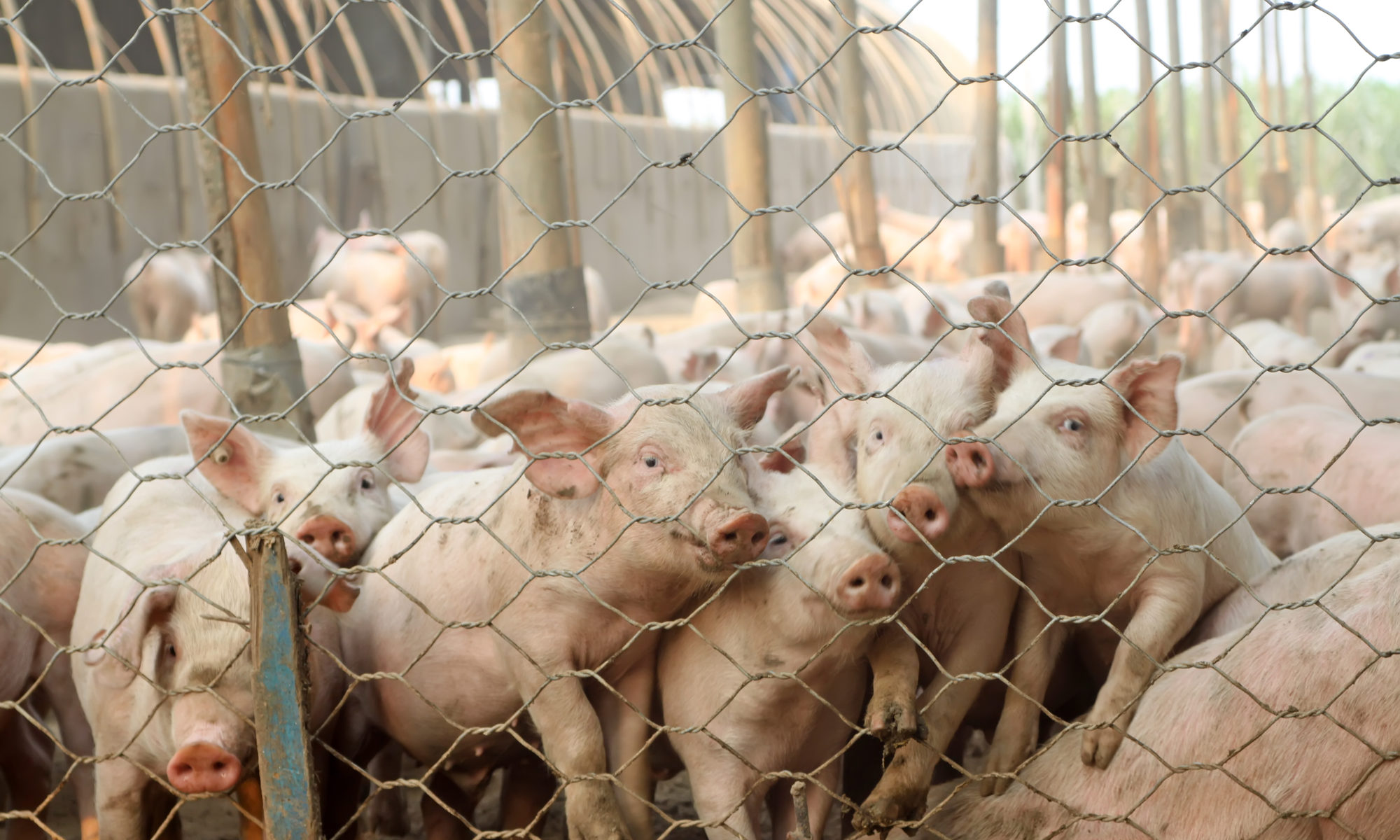In the middle of the night sometime in 2017, members of the animal welfare group Direct Action Everywhere entered Circle Four Farm, a factory farm in Beaver County, Utah, that processes and kills 1.2 million pigs a year for Smithfield Foods, the largest meat production company in the country. One of their objectives was to film the way that the animals in the facility were being treated. A second objective was to rescue some of the most vulnerable animals that they found.
On July 6th, the group posted the video of their experiences that night on YouTube. As it begins, the filmmakers describe witnessing a sow who had collapsed with sickness and was no longer capable of feeding piglets being tossed headfirst into a pile of at least a hundred dead young animals. The footage goes on to document countless sows and their piglets kept in very small crates. It includes disturbing images of a sow in a gestation crate, feeding some piglets while surrounded by other dead and crushed piglets, covered in feces, crammed into the tight space. The group selects two piglets to take with them. The first was a piglet who was found with her face covered in blood. She was small and close to death. The nipples of her mother were so badly cut that they no longer provided milk and her piglets were drinking blood to survive. This piglet was not likely to survive without intervention. The second piglet was weak with starvation and had collapsed. Prospects for survival for this piglet were similarly bleak. The cash value of the two animals was $42.50 each.
The loss of pigs such as these is built into the business plan of Circle Four Farms since many animals do not survive under these conditions. These piglets in particular, because of the state of their health at the time that they were found, were likely to die and to be counted among these losses.
The group took the two piglets from the facility, and brought them to a waiting vehicle where they were immediately fed. They received veterinary services and were then taken to an animal sanctuary to live out the remainder of their lives in peace. At the end of the video, the piglets are shown healthy and seemingly happy, while a member of the welfare group explains that rescuing animals from factory farms is crucial for the animals involved, but also serves an important function for the movement; optimism and hope can serve as an antidote to the despair caused by the magnitude of the problem of animal mistreatment in the world.
After the video was published on YouTube, an FBI manhunt for the people involved ensued and significant resources were used. During a government raid of an animal sanctuary, FBI veterinarians sliced off a portion of a pig’s ear for the purposes of genetic testing. Eventually, the investigation led to the arrest of activists Wayne Hsiung and Paul Darwin Picklesimer. The federal government declined to prosecute, but Utah prosecutors elected to pursue felony burglary and theft charges for which the defendants could have potentially faced ten years in prison.
When the case went to trial, District Court Judge Jeffrey Wilcox made a series of admissibility rulings that shocked those watching the case closely. He blocked the jury from viewing the video that the group took that night, which was the very video that motivated the investigation and prosecution in the first place. He only let jurors see photographs of the scene in an edited form (for instance, he ordered an image cut in half that portrayed a piglet sucking from a cut and bloody nipple), and he did not allow any evidence about the motive for the removal of the piglets to be introduced.
In other words, the judge would not allow the jury to hear that piglets were removed to save their lives or that the group entered the facility to raise awareness about animal mistreatment and cruelty. His justification for these rulings was that the case was about burglary, not about animal rights.
These rulings were made in the political context of a state with an economy that relies heavily on industrial animal agriculture. In 2012, as protection for these institutions the state implemented an “ag-gag law” that made it illegal to document evidence of animal abuse on factory farms. That law was ruled unconstitutional in 2017.
Despite the evidentiary restrictions, on October 8th, 2022, the jury acquitted Hsiung and Picklesimer of all charges. This is now being treated as a landmark case in animal law and animal ethics in general, and as an important case study for discussion of a potential right to rescue animals in distress.
Though many view the outcome of the trial as a victory, others are critical. They argue that trespassing, burglary, and theft are against the law for good reason. If a person or group has an important message to convey, surely they can do so without breaking the law. Some argue further that animals have a lesser or even non-existent moral status — they exist on this planet for us to do with what we will. We simply do not have the space to raise these animals on large farms where they can roam free and doing so would be impractical. If we want to feed the world’s population and to do so in ways that many people consider healthy and delicious, this form of meat production is our only choice. Critics also raise concerns that abandoning industrial animal agriculture would be devastating to the economy. The overriding principle to which many people on the other side of this case appeal is that our sole obligation is to do what is best for human beings. That animals trap and kill other animals is just a fact of nature, and there is no reason why humans should be exempt from that general principle.
Animal advocates argue that it is simply not true that this is the only way we can feed the human population in both healthy and delicious ways. Humans can satisfy their nutritional needs by eating plant-based foods.
Non-human animals, and farm animals in particular, can experience a full range of emotions, including suffering and joy. They form strong emotional attachments to their peers and to their offspring.
In light of this, if we can meet our food needs in other ways, we ought, morally, to do so.
The strategy employed by Direct Action Everywhere is nothing new. Their defenders argue that the actions of the group were an instance of justified civil disobedience — a strategy defended and practiced by figures like Henry David Thoreau, Mahatma Gandhi, and Martin Luther King Jr. Thoreau, for instance, refused to pay taxes in support of a government that actively participated in the institution of slavery. He argues that if a law
is of such a nature that it requires you to be the agent of injustice to another, then, I say, break the law. Let your life be a counter-friction to stop the machine. What I have to do is to see, at any rate, that I do not lend myself to the wrong which I condemn.
Martin Luther King Jr. broke unjust laws on many occasions and was jailed 29 times. In his Letter from a Birmingham Jail, he argues to the local clergy imploring him to change his tactics,
You deplore the demonstrations that are presently taking place in Birmingham. I am sorry that your statement did not express a similar concern for the conditions that brought the demonstrations into being. I am sure that each of you would want to go beyond the superficial social analyst who looks merely at effects and does not grapple with the underlying causes.
The activists who broke into Circle Four Farm that night in 2017 made no attempt to keep their actions secret, indeed, they posted their activities on the internet for the whole world to see. They engaged in civil disobedience fully aware that they might face consequences. In their trial, Justice Wilcox ruled in ways that sought to prevent careful consideration of underlying causes and encouraged jurors to focus on only one effect — theft. The jury refused to do so. The powerful lobby for industrial animal agriculture does everything in its power to control public perception of food production in the country and worldwide. With such widespread manipulation taking place, if the well-being of animals matters, we arguably can’t afford to wait. As Thoreau says, of unjust laws and practices,
Men generally, under such a government as this, think that they ought to wait until they have persuaded the majority to alter them. They think that, if they should resist, the remedy would be worse than the evil. But it is the fault of the government itself that the remedy is worse than the evil. It makes it worse. Why is it not more apt to anticipate and provide for reform? Why does it not cherish its wise minority? Why does it cry and resist before it is hurt? Why does it not encourage its citizens to be on the alert to point out its faults, and do better than it would have them?


